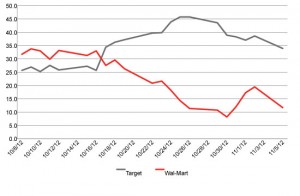Every year a familiar complaint resurfaces around the autumn months among consumers across the country. While shopping for a Thanksgiving turkey, a Halloween costume, or even back-to-school supplies, they are already bombarded by the images of snowmen and reindeer that can only mean one thing: holiday advertising. It seems the often-dreaded onset of seasonal marketing moves earlier with every winter (or fall), and consumers aren’t exactly feeling the holiday cheer.
As of November 7th, 38% of respondents in a yearly online survey said they have already noticed multiple ads for holiday sales and stores, yet only 17% of shoppers said they believe holiday ads that air before Thanksgiving are effective. The general attitude of American buyers remains that the holidays are a special time to be celebrated with family, not to be exploited for profits by the relentless onslaught of commercialism.
Many Americans were outraged at Kmart’s early start on Holiday advertising this year, which aired seasonal commercials as early as September 8th. Customers complained that it was ridiculous to even think of the Christmas shopping recommended by the commercials with 108 days still remaining until the holiday.
Early advertising, however, has proved profitable for companies in the past. In 2012, for example, Target launched an early holiday marketing campaign in October, while Walmart, apparently missing the memo, stuck to traditional, mainly post-Thanksgiving advertising. Sales for Walmart subsequently plummeted over the months of October and November, lost to their already-spirited competitors.

With this considered, it makes sense that retailers would be eager to begin the holiday season as soon as possible. In fact, seasonal proceeds often comprise from 20 to 40 percent of many companies’ annual sales, making them largely dependent upon the holiday season for their business’s welfare. Consumers, however, have little understanding for the capitalist plights of competing companies, feeling that to be focused on garnering profits from such cherished holidays qualifies as Grinch-worthy behavior.
Unfortunately for them, however, early holiday advertising isn’t going away anytime soon, according to Le Moyne College psychology professor Krystine Batcho. In an interview with CBS, Batcho discussed the unlikelihood of a respite from this kind of marketing. “At this time, business owners might ignore consumer complaints, because they feel that consumers have little choice,” Batcho said. “Holiday buying is so expected in our culture, that people feel obligated to buy gifts regardless of any irritation they might feel about early advertising.”
As long as there is money to be made, businesses are likely to continue pushing the start of the holiday season – at least for their ads – back as far as they can. If buyers are seriously opposed to this practice, they’ll have to put their money where their mouths are and send a message to the offending companies that pre-Thanksgiving ads aren’t doing any good. But until then, shoppers will just have to grin and bear the sleigh bells jingling a little early.
Statistical data compiled from:
http://aytm.com/blog/daily-survey-results/early-holiday-shopping-survey-2/
http://abcnews.go.com/Business/kmart-faces-criticism-holiday-television-ad-summer/story?id=20234844
http://connecticut.cbslocal.com/2013/11/01/stores-nationwide-begin-holiday-season-early-despite-negative-reaction/
https://today.yougov.com/news/2012/11/12/targets-early-holiday-ads-pay/


